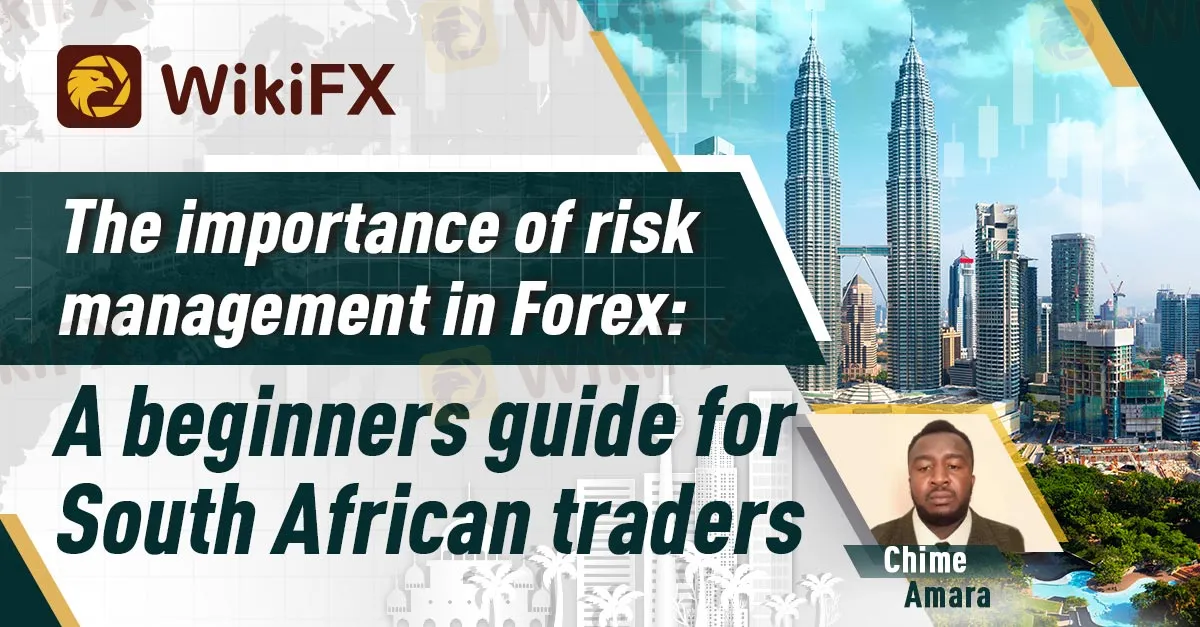简体中文
繁體中文
English
Pусский
日本語
ภาษาไทย
Tiếng Việt
Bahasa Indonesia
Español
हिन्दी
Filippiiniläinen
Français
Deutsch
Português
Türkçe
한국어
العربية
The importance of risk management in Forex: A beginner’s guide for South African traders
Abstract:The quest to make quick profits from the market has often led some traders to neglect the need for applying proper risk management practices while taking any positions in the market. Some traders tend to trust so much in the accuracy of their analysis and predictions that they neglect that the market can as well disappoint. The outcome of this negligence is always unbearable and often, had resulted in such traders losing their entire capital. Proper risk management practices remain the best way for guarding against loss and remaining profitable in the forex market today.

By: Chime Amara

What is Risk management?
Risk management is the practice of guarding against excessive loss by protecting one's position should the market go contrary to the trader's predictions.
What are the risk management practices?
There are basically four major risk management practices obtainable in forex trading. We have discussed them below.
A. Use of Stop loss: Stop loss is an important risk management practice that involves setting a pending order below or above one's position to close one's open position should the market take the opposite course of the trader's forecast. Often a Stop loss order is set 30 - 50 pips away from one's entry. Some prefer mapping out only 1% of their capital as the stop loss target.
B. Setting take-profit target: The fact that the market often spiked to hit certain levels and then reverse from it, has made it very necessary for traders to set their targets for each position they take in the market today. Setting a take-profit order helps to close one's trades when the market gets to the indicated level.
C. Correct use of Lotsize: Lotsize is the buying power due to each trader based on his capital. One of the greatest means through which traders can manage their risk well is by choosing the correct lotsize due to their capital. Using excessive lotsizes endangers the trader's capital in cases where the market goes against him.
D. Hedging: Hedging involves taking two different positions at the same time in the market as a way of guarding against loss. Here the trader often placed a new trade above or below his stoploss to be triggered in cases when the market reverses and cuts off his stop loss target. Similarly, hedging includes but is not limited to taking two opposite positions at the same time.
Conclusion
The importance of risk management practice in forex trading can never be overemphasized. Thus, without proper risk management practice put in place, the trader is all the more exposed to losing a greater part of his capital due to high market volatility. It is therefore necessary for all forex traders to apply proper risk management practice while taking any positions in the market today.

Disclaimer:
The views in this article only represent the author's personal views, and do not constitute investment advice on this platform. This platform does not guarantee the accuracy, completeness and timeliness of the information in the article, and will not be liable for any loss caused by the use of or reliance on the information in the article.
Read more

TradingView Brings Live Market Charts to Telegram Users with New Mini App
TradingView has launched a mini app on Telegram, making it easier for users to track market trends, check price movements, and share charts.

March Oil Production Declines: How Is the Market Reacting?
Oil production cuts in March are reshaping the market. Traders are closely watching OPEC+ decisions and supply disruptions, which could impact prices and future production strategies.

How to Calculate Leverage and Margin in the Forex Market
Leverage amplifies both potential profits and risks. Understanding how to calculate leverage and margin helps traders manage risks and avoid forced liquidation.

USD/INR, USD/PHP Forecast April 2025
The global forex markets are bracing for April 2025 with divergent forecasts for key emerging market pairs. In particular, the USD/INR and USD/PHP pairs have attracted significant attention amid a mix of central bank interventions, evolving U.S. policy signals, and regional economic shifts. In this article, we review multiple forecasts, examine the driving factors, and outline what traders might expect as the month unfolds.
WikiFX Broker
Latest News
The Withdrawal Trap: How Scam Brokers Lure Victims into Paying More
FCA to Investors: Think Twice Before Trusting These Brokers
Trump\s tariffs: How could they affect the UK and your money
Trump gambles it all on global tariffs he\s wanted for decades
TradingView Brings Live Market Charts to Telegram Users with New Mini App
Trump tariffs: How will India navigate a world on the brink of a trade war?
IG Group Acquires Freetrade for £160M to Expand UK Investment Market
U.S. March ISM Manufacturing PMI Released
Should You Beware of Forex Trading Gurus?
Exposed by SC: The Latest Investment Scams Targeting Malaysian Investors
Currency Calculator







